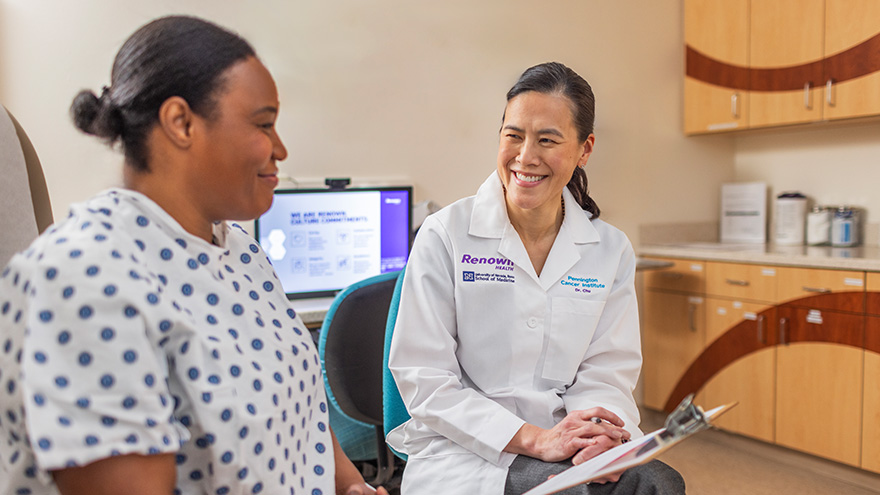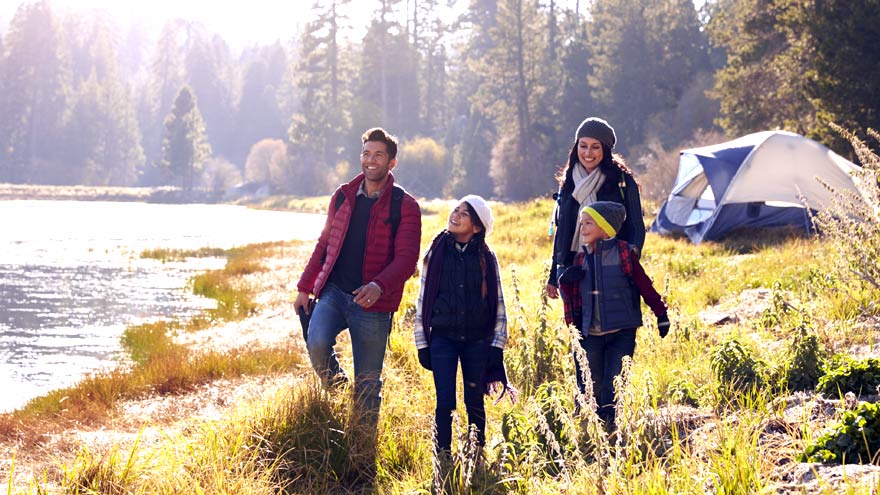Search
-
Guide to Cancer Screenings
One of the most crucial aspects of maintaining health and wellness is staying proactive about regular cancer screenings. Early cancer detection significantly increases the chances of successful treatment and survival. The multidisciplinary care team at the William N. Pennington Cancer Institute at Renown Health provides compassionate care and support to the community for early detection and diagnoses. This comprehensive guide outlines the various cancer screenings available for breast, colorectal, lung, cervical, prostate and skin cancer. Breast Cancer Screening Who Should Get Screened? Mammograms are recommended starting age 40 for those considered at average risk for breast cancer. Women with a family history or other risk factors should discuss appropriate screening options with their healthcare provider. Women under 40 with a family history should discuss risk factors with a healthcare provider. Screening Methods Mammogram: This provides an X-ray of the breast and can detect tumors that are not yet palpable. Breast MRI: This type of scan is recommended for women at high risk for breast cancer due to genetic factors or family history. Screening Breast Ultrasound: This scan can help in identifying masses in denser breast tissue that might not be visible on mammogram. It is recommended in addition to a mammogram for patients at a higher risk for breast cancer. What to Expect During a mammogram, the breast is compressed between two plates to capture X-ray images. Some pressure or discomfort may be felt, but the procedure is brief and critical for early detection. Colorectal Cancer Screening Who Should Get Screened? Adults aged 45 to 75 should undergo regular colorectal screenings. Some adults under 45 may need to be screened earlier depending on family history or other genetic risks. Those over 75 should consult with their healthcare provider to determine if continued screening is necessary. Screening Methods Colonoscopy: This procedure uses a flexible tube with a camera to examine the entire colon. Fecal Immunochemical Test (FIT): A non-invasive test that detects hidden blood in the stool. CT Colonography (Virtual Colonoscopy): Uses Computed tomography (CT) imaging to provide detailed views of the colon. What to Expect A colonoscopy can detect changes or abnormalities in the large intestine (colon) and rectum. Screening is usually advised every ten years, but if you are at risk, screening may be recommended every 3 to 5 years after your initial colonoscopy. Colonoscopy preparation includes bowel cleansing the day before and sedation during the procedure. FIT is a simple at-home test requiring no special preparation. Lung Cancer Screening Who Should Get Screened? Adults aged 50 to 80 with a significant smoking history (20 pack years or more) and who currently smoke or have quit within the past 15 years. Screening Methods Low-dose Computed Tomography (LDCT): A CT scan with low radiation doses to create detailed images of the lungs. What to Expect LDCT is a non-invasive scan that requires you to hold your breath for a few seconds. Cervical Cancer Screening Who Should Get Screened? Women aged 21 to 65 should undergo regular screenings. Women aged 21 to 29 should have a Pap test every three years. Women aged 30 to 65 should have a Pap test and HPV test every five years, or a Pap test alone every three years. Screening Methods Pap Test (sometimes called a Pap Smear): Collects cells from the cervix to detect precancers. HPV Test: Identifies high-risk human papillomavirus (HPV) types that can cause cervical cancer. What to Expect The Pap test involves collecting cells from the cervix using a small brush. Some discomfort may be felt, but the procedure is brief and crucial for early detection. Prostate Cancer Screening Who Should Get Screened? Men aged 50 and older should discuss screening options with their healthcare provider. Men at higher risk (African American men and those with a family history of prostate cancer or are a BRCA2 gene carrier) should begin discussing screenings at age 40. Screening Methods Prostate-Specific Antigen (PSA) Test: Measures PSA levels in the blood. Digital Rectal Exam (DRE): A physical examination where the provider feels the prostate through the rectum to detect abnormalities. What to Expect The PSA test is a simple blood test. The DRE may cause slight discomfort but is quick and essential for early detection. Skin Cancer Screening Who Should Get Screened? Anyone with a suspicious lesion or abnormal area on their skin. Individuals with more than 50 moles or dysplastic moles. Those with a personal history of melanoma or history of other skin cancers. Those who have more than one member of immediate family with a history of cancers (melanoma, breast cancer, pancreatic cancer) or a family member who was diagnosed with melanoma before they were 50 years old. Positive gene testing for BRACA2, Lynch syndrome genes (MLH1, MSH2, MSH6, PMS2 or EPCAM). Screening Methods Skin Exam: A visual examination by your provider to check for unusual moles, birthmarks, or other skin changes. Biopsy: Removal of a small sample of skin for testing if an abnormal area is identified. What to Expect A skin exam is non-invasive and visual. A biopsy involves minor discomfort and local anesthesia if needed. Expert Advice Although the cadence of these skin screenings may or may not be annual, as one's age increases, the risk of many cancers rises. Everyone benefits from attentive sun protection, including avoiding direct sun between 10 a.m. and 4 p.m. by seeking shade and wearing hats, clothing and sunscreen. When purchasing sunscreen, look for SPF 50, UVA/UVB broad spectrum. Questions to Discuss with Your Healthcare Provider What is my risk level for different types of cancer? Which screening tests do you recommend for me and why? What are the potential risks and benefits of each test? How often should I get screened? What steps to follow if a test result is abnormal? Importance of Cancer Screenings Regular cancer screenings are vital for maintaining your health and catching cancer early, when it is most treatable. Renown Health is dedicated to guiding you through the process and providing the highest quality of care. Consult with your healthcare provider to determine the appropriate screenings for your specific needs and to take proactive steps toward a healthier future.
-
Human Trafficking Happens in Nevada
Each month an average of 5,016 individuals are sold for sex in Nevada. Frequently the victims of human trafficking are women and children. That’s why Renown, along with other community groups, is leading efforts to help victims. Specifically identifying them and connecting them to the support services they need. The purpose is to restore their mental and physical health give them hope for a better life. Supporting Our Community Our goal is to identify victims, providing compassionate care for the complex needs of this vulnerable population. By building partnerships with key agencies and advocates in the community and creating policies around human trafficking, we also aim to transition victims safely to community-based services. Along with training, Renown healthcare workers are armed with pocket guides reminding them how to support human trafficking victims. To provide awareness about this crisis, Renown has implemented four key initiatives: Educate health care providers Execute policies and procedures to identify victims Build partnerships with local law enforcement, emergency services and local advocates Connect victims to crucial community resources Human Trafficking: How You Can Help Awaken acts to transform our community with the ultimate goal of ending commercial sexual exploitation. In 2020, Awaken worked with 173 women and children. Awaken’s programs include a drop-in center, an 18 to 24 month transitional housing program, an educational center for trafficked youth, rental assistance, recovery groups, therapy, tutoring, case management, mentorship, safety, and community. National Human Trafficking Hotline: 1-888-373-7888 Local Emergency: 911 Did You Know?
-
6 Getaways That Will Make You a Happy Camper
Some people drive for hundreds of miles just to pitch a tent in what we're fortunate enough to call our backyard. From alpine hiking trails and miles of remote forest to desert lakes and spectacular night skies, there's no better way to unwind and explore the outdoors than camping. If you've been daydreaming of hiking trails and swimming holes or looking for a tranquil and adventurous family vacation, it's time to clear your schedule, pack up the car and venture into the Great Outdoors. We've got six fun and beautiful camping getaways you need to experience this summer that will leave you feeling relaxed and rejuvenated. And best of all, they're just a short drive away. Emerald Bay State Park South Lake Tahoe, Calif. Highway 89 Summer Boat-In Camping: Available by reservation. Accessible by boat or foot. Cost: $35 per night Dogs? Allowed in campground on a 6 foot leash. They cannot be on trails or roads into Emerald Bay or on the beach. Information/Reservations: 530-525-7232 or www.reserveamerica.com To say this camping location is stunning is an understatement. If you're seeking a view from your campsite of blue lake waters, thick forest and jutting rocks, than this is the spot for you. This campsite is located on the north side of Emerald Bay, at old Emerald Bay Resort, and offers hiking and walking trails and easy access to Lake Tahoe. There are also large rocks you can jump from into the lake. Davis Creek Regional Park West Side of Washoe Valley US 395 South Cost: $20, cash only Dogs? Yes. $1 per night fee per pet and they must be leashed. Information/Reservations: (775) 823-6501 or www.washoecounty.us/parks Located in the foothills of the Carson Range 20 miles south of Reno, Davis Creek campground offers over 60 overnight sites along with equestrian trailheads that provide access to the Toiyabe National Forest. The campsite is well-known for outstanding views of Washoe Valley and Slide Mountain and includes picnic areas, a small pond and nature trails. Showers are also available. Donner Memorial State Park Truckee, Calif. 12593 Donner Pass Road Cost: $35 per night Dogs? Contact for information. Information/Reservations: (530) 582-7892 or www.parks.ca.gov If you're looking for a little more to your camping adventure than what nature has to offer, Donner Memorial State Park may be the ideal campground for you. The park includes the Emigrant Trail Museum, with historical and regional exhibits including the Donner Party tragedy during the severe winter of 1846, as well as hiking trails, Donner Lake swimming and picnic areas. Fallen Leaf Campground South Lake Tahoe, Calif. 2165 Fallen Leaf Road Cost: $33 to $84/day Dogs? Allowed at tent and RV sites (a maximum of two pets per site); prohibited on beaches. Information/Reservations: (530) 544-0426 Nestled among pine and aspen trees and wildflower meadows, Fallen Leaf offers campers the best of both worlds: mountain landscapes and lake recreation. Located less than a mile away from the south shore of Lake Tahoe, the campground features more than 200 camping sites including tent, RV and several yurt rentals. There are many shady campsites for campers to choose from, as well as food lockers, toilets, showers and a general store. The lake is only a short walk from the sites and features views of Cathedral Peak (8,200 feet) and Mount Tallac (9,738 feet) and there are several trails for hikers. Pyramid Lake Marina & Beach Camping Pyramid Lake Pyramid Lake Store, 29555 Pyramid Lake Road Cost: $9 per day Dogs? Allowed without restrictions. Information/Reservations: 775-476-0555 or www.pyramidlake.us The largest natural lake in Nevada, just 40 miles from Reno, is located between the Virginia and Lake Mountains on Paiute Indian land -- the Pyramid Lake Reservation. It's an ideal locale for boating and fishing and for those who are looking for remote beach camping and easy access to swimming. There are multiple camping spots around the lake -- including an RV park and designated and open camping -- but campers must obtain a tribal camping permit prior to settling in. Note: This is a desert lake and therefore, has limited shade. Campers should plan accordingly with shade sails and pop up shade tents. Camp Richardson Resort South Lake Tahoe, Calif. 1900 Jameson Beach Road Cost: Contact for specifics. Dogs? No. Information/Reservations: 800-544-1801, reservations@camprichardson.com Whether you're seeking the solace of a shaded forest or craving lazy beach days, Camp Richardson offers a wide variety of camping and lodging needs. Located on the south shore of Lake Tahoe, Camp Richardson features over 30 cabins, 26 lodge hotel rooms, a beachside inn, duplex and house, as well as 200 tent camping sites and 100 RV sites. The resort campground offers year-round camping and a wide variety of services, including a marina, sports center, restaurant and a store.
Read More About 6 Getaways That Will Make You a Happy Camper


